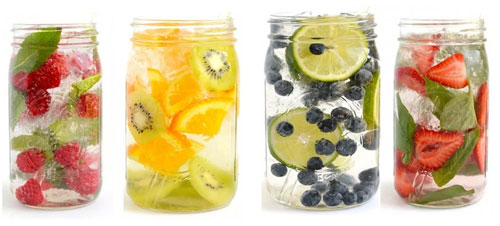Elders are at greater risk of dehydration because their kidney and other digestive organs have slowed, therefore they’re absorption of nutrients deprive them of being hydrated adequately.
Dehydration can be expressed by feelings of thirst or hunger, which can be triggered by certain medications, illnesses or injuries.
When you breathe, sweat, urinate and pass a bowel movement, your body is getting rid of fluid. If you don’t drink enough fluids to replenish your body with the necessary amount of H2O, then the body does not function to its normal and complete capacity.
An average Elder requires approximately 2 litres of water or fluids, each and every day to maintain good health. If the kidney does not receive an adequate amount of water or fluid then it cannot excrete the minimum of half a litre of waste per day that is required. Inadequacy of fluid or water can cause kidney stones, while adding stress to the kidney organ.
Nutritious fruit infused waters
to prevent de-hydration

Signs of dehydration include:
- Confusion;
- Drowsiness;
- Feeling lightheaded;
- Laboured speech;
- Sunken eyeballs.
Effects of dehydration include:
A headache and the sensation of being very thirsty are often the signs of dehydration and can be indicators of a disruption of electrolytes (salt and water balance).
Other effects are:-
- loss of muscle tone;
- excess weight gain;
- slow metabolism;
- increased toxicity;
- organ failure.
If you are concerned about a Loved One or Elderly friend, it is important that you do not try to force a change in their behaviour. Instead, get creative so they are more accepting of adapting a healthier way.
The good news is that most effects of dehydration are preventable.
A person’s diet can greatly affect hydration levels: fruits (especially watermelon), vegetables, and soups are mostly water-based.
Flavoured waters are a great way to entice people to increase their water intake. They are fun to make and taste great so why not give them a try?
Preventing dehydration in Elders
To help make sure your Loved One doesn’t suffer from dehydration, make sure he or she consumes an adequate amount of fluids during the day; eats healthy, such as water-content foods like fruit, vegetables and soups. It may be worth considering, to check their urine colour is light and the output quantity is adequate.
Elders also need to be educated on drinking an adequate amount of water and fluids, even when they’re not thirsty. Keeping a water bottle next to the bed or their favourite chair could help, especially if they have mobility issues.
Making sure your Loved One stays hydrated, is much easier than treating him or her for dehydration later. Prevention is the key, to avoid becoming ill or being hospitalised.
If you suspect dehydration in an Elderly Loved One, you can check for a decrease in skin turgor by pulling up the skin on the back of the hand for a few seconds; if it does not return to normal almost immediately, the person is dehydrated.
Note: Drinking water at room temperature is recommended for a quicker absorption.
Do you have any tips on staying hydrated? Leave a comment below, we’d love to hear your ideas.
If you are going away over the summer months or if you need regular in Home Care services for your Loved One, take a look at all our Care services. If you are not sure what type of care services, you require or you’d like to book a service, give us a call on 02 9970 7333.
Source:
http://www.sheuncovered.com/2015/05/fruit-infused-water-6-ways/
http://www.seniorshomecare.com/blog/archives/2011/03/28/keeping-the-elderly-hydrated-being-creative/
http://guthealthproject.com/hydration-the-key-to-good-digestion/

Leave A Comment